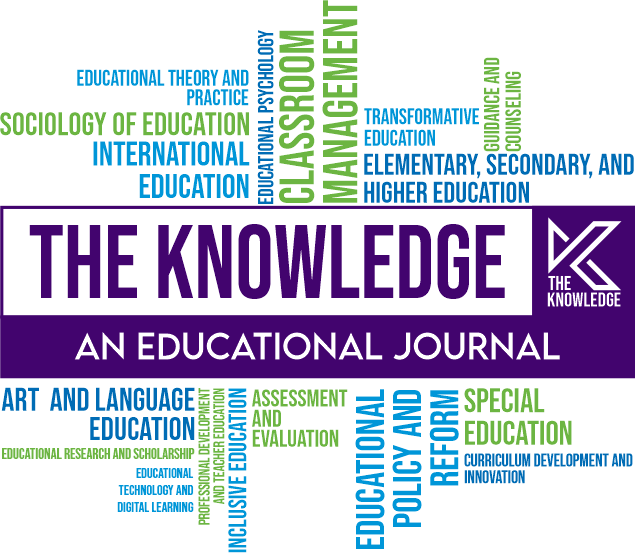Developing Critical Thinking Skill among Prospective Teachers at the Undergraduate Level: An Experimental Study
DOI:
https://doi.org/10.55737/tk/2k25b.42066Keywords:
Critical Thinking, Prospective Teachers, Undergraduate LevelAbstract
The present study aimed to develop critical thinking skills among prospective teachers at the undergraduate level. The present study was experimental in nature. The population of the present study consisted of all prospective teachers from the Department of Education at the University of Lahore. The study sample comprised eight students from the B.Ed. (Hons) Elementary 2nd semester. The experiment consisted of 16 weeks. The researcher used an A-B-A withdrawal design of single-subject research, which is an adaptation of the basic time series design. The experiment consisted of three phases: an initial baseline phase without treatment, a treatment phase introducing critical thinking strategies, and a withdrawal phase reverting to baseline conditions. Findings indicated that treatment significantly developed the critical thinking skills among prospective teachers at the undergraduate level. Moreover, visual analysis indicated the same results during the withdrawal phase. The present study recommends embedding critical thinking goals in all education courses, with emphasis on teaching, lesson planning, and assessment. Focus on developing critical thinking skills in students to analyse, evaluate, and synthesise ideas.
References
Bean, J. C. (2011). Engaging ideas: The professor’s guide to integrating writing, critical thinking, and active learning in the classroom (2nd ed.). Jossey-Bass.
Condon, W., & Kelly-Riley, D. (2004). Assessing and teaching what we value: The relationship between college-level writing and critical thinking abilities. Assessing Writing, 9(1), 56–75. https://doi.org/10.1016/j.asw.2004.01.003
Dewey, J. (2024). Democracy and education. Columbia University Press. https://doi.org/10.7312/dewe21010-003
Facione, P. A. (2020). Critical thinking: What it is and why it counts (2020 ed.). Insight Assessment.
Halpern, D. F. (1997). Critical thinking across the curriculum: A brief edition of thought and knowledge. Routledge. https://doi.org/10.4324/9781315805719
Keith, N., & Kurfiss, J. G. (1990). Critical thinking: Theory, research, practice, and possibilities. Teaching Sociology, 18(4), 581. https://doi.org/10.2307/1317666
Krupat, E., Sprague, J. M., Wolpaw, D., Haidet, P., Hatem, D., & O’Brien, B. (2011). Thinking critically about critical thinking: ability, disposition or both?. Medical education, 45(6), 625-635. https://doi.org/10.1111/j.1365-2923.2010.03910.x
Kuhn, D. (1999). A developmental model of critical thinking. Educational Researcher, 28(2), 16–25. https://doi.org/10.3102/0013189X028002016
Mpofu, N., & Nthontho, M. (2017). Connecting the dots: Exploring dispositions in teacher education. Gender and Behaviour, 15(4), 10290-10303. https://hdl.handle.net/10520/EJC-c1ec02b30
Paul, R. (1991). Critical thinking: What every person needs to survive in a changing world. Nassp Bulletin, 75(533), 120-122. https://doi.org/10.1177/019263659107553325
Paul, R., & Elder, L. (2019). The miniature guide to critical thinking concepts and tools. Rowman & Littlefield.
Pithers, R. T., & Soden, R. (2000). Critical thinking in education: A review. Educational Research, 42(3), 237–249. https://doi.org/10.1080/001318800440579
Rivas, S. F., Saiz, C., & Almeida, L. S. (2023). The role of critical thinking in predicting and improving academic performance. Sustainability, 15(2), 1527. https://doi.org/10.3390/su15021527
Taghva, F., Rezaei, M., Ghaderi, E., & Taghva, R. (2014). Studying the relationship between critical thinking skills and students’ academic performance. Journal of Educational and Instructional Studies in the World, 4(3), 97–104. http://dx.doi.org/10.18052/www.scipress.com/ILSHS.25.18
Williams, R. L., & Stockdale, S. L. (2003). High-performing students with low critical thinking skills. Journal of General Education, 52(3), 199–225. https://www.jstor.org/stable/27797955
Williams, R. L., Oliver, R., Allin, J., Winn, B., & Booher, C. (2003). Psychological critical thinking as a course predictor and outcome variable. Teaching of Psychology, 30(3), 220–223. https://doi.org/10.1207/S15328023TOP3003_04
Downloads
Published
Issue
Section
License
Copyright (c) 2025 Copyright in the THE KNOWLEDGE is retained by the author(s). Authors also grant any third party the right to use the article freely as long as its integrity is maintained and its original authors, citation details and publisher are identified.
This work is licensed under a Creative Commons Attribution-NonCommercial 4.0 International License.







